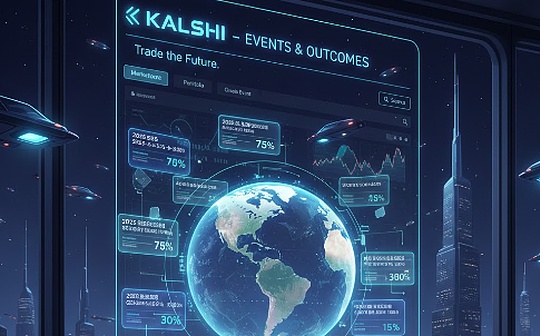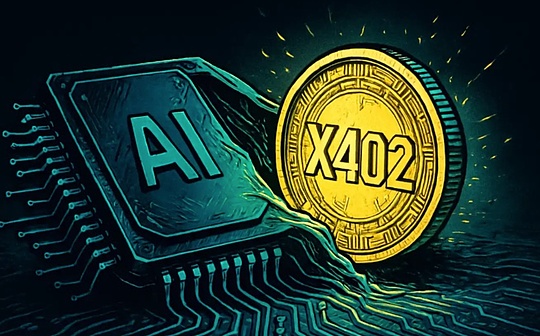
Author: Alexander Nardi Source: Shoal Research Translation: Shan Ouba, Bit Chain Vision
introduction
-
Change through the AI proxy: AI agents will innovate games and entertainment by providing personalized, dynamic and immersive experiences, far exceeding the traditional user generation content (UGC).
-
Progress of AI technology: Strengthening key progress such as learning, neural networks, and generating models (GAN) is essential to develop complex AI agents.
-
Integration with the blockchain: The blockchain provides a safe, unchanged and transparent environment for deployment of AI agents, which greatly enhances its ability and reliability.
-
AI innovation case research: Virtuals protocol and Echelon Prime show how AI agents unlock new opportunities in games and entertainment through their innovative applications and decentralized ecosystems.
-
Challenge and regulatory needs: Make sure that seamless communication, strong infrastructure and ethical use are essential for AI agents.Further supervision and protection measures (such as the “emergency stop switch”) are vital to prevent void and establishment of trust.
-
Future prospect: The continuous evolution of AI agents may expand to audio to video fields and wider consumer applications, and promote mainstream adoption and innovation.
AI agent: “ace” in the field of web3 games and entertainment
The rapid evolution of games and entertainment
The game industry is experiencing the transformation time of user -generating content (UGC).Main games like Roblox and The Sandbox allow users to create and personalized their gaming experience.The emergence of AI virtual assistants and partners has further enhanced this change, which not only helps personalized games, but also becomes another form of UGC.Users will soon start fine -tuning their partners and may make them interact with others, similar to the variants of ChatGPT and TutorGPT trained by users.
Google DeepMind’s achievements in AI, especially its latest international chess engine, shows the potential of AI agents in the game.This engine forms a master -class engine that can master each game by adopting multiple AI agents of different styles.This “no search” chess engine understands the position by evaluating, selects the most suitable agent for each start, and imitates human diversity and creativity.
Many established blockchain native AI agreements focus on decentralized computing and governance frameworks, laying the foundation for responsible AI development.In the case of these infrastructure, developers now turn to more complicated AI models, such as AI agents, these agents can perform independent tasks under the smallest human intervention.
Blockchain technology has further promoted this evolution. By providing a decentralized infrastructure to ensure the transparency, security, and indispensable transactions.In these standardized environments, integrating the AI agent can create a more cooperative and personalized experience for users, so as to change the game and entertainment industry in an unimaginable way.
What is AI agent?
The AI agent is essentially a software program that can interact with its environment independently, collect data from its interaction, and use these data to achieve its predetermined goals.The goal can be from task automation to more complicated decision -making processes.The key to the AI agent is its autonomy, that is, minimize human intervention when performing specific targets.These programs can perform their tasks independently and have access to “reading” and “writing”.Unlike today’s popular AI applications (such as ChatGPT) that can only respond to the problem (read access), the AI agent can also take action based on the collected information (write access).
>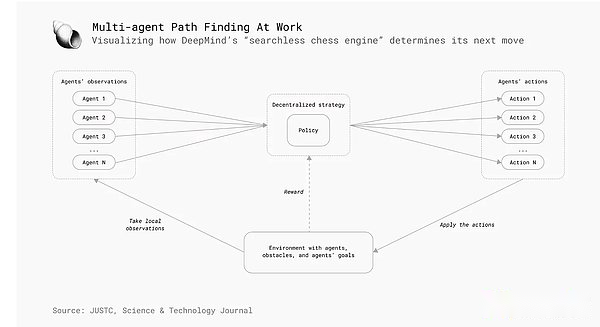
The origin of the autonomous agent can be traced back to a wider effort to learn machines that can learn from the environment and make wise decisions from the environment and make wise decisions from the environment in the 1980s and 1990s.The development of various machine learning, deep learning, and neural network algorithms has laid the foundation for the more advanced forms of agents seen today, such as Google Deepmind’s new chess engine. The engine uses multiple AI agents to master various gameplay.
Progress of AI methodology
Strengthening learning has played an important role in the development that can navigate the complex environment of independent navigation and achieve specific goals.Neural networks, especially deep learning models, enable AI proxies to process a large amount of data and identify patterns, and expand their potential applications in various fields such as games and entertainment.
A major breakthrough to empower the AI proxy is the development of the confrontation network (GAN).GAN consists of two neural networks, a generator and a discriminator, and they work together to create real data.The generator creates data, the discriminator compares it with real data, and provides feedback to improve the output of the generator.This iterative process makes it possible to create a highly realistic virtual role, environment and even art, making GAN particularly valuable in games and entertainment.
>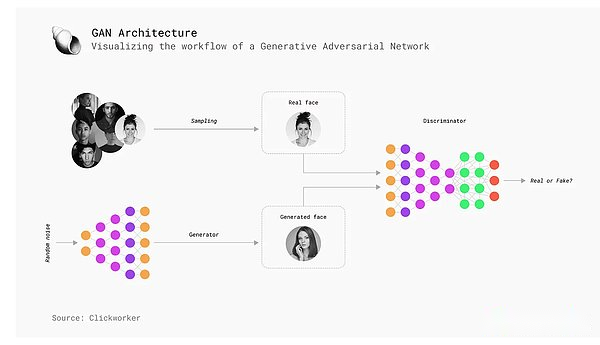
Another important progress is migration learning, that is, pre -trained AI models on big data sets are finely adjusted for specific tasks.This method greatly reduces the time and resources required to develop complex AI agents.Migration learning enables the AI agent to use existing knowledge and adapt to the new environment and tasks to make it more diversified and efficient.
AI proxy application
>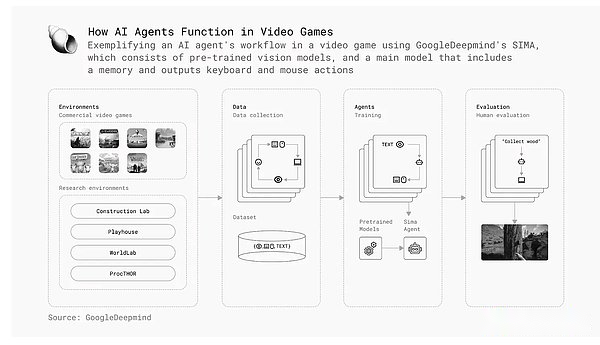
In a multi -agency system, multiple agents collaborate to achieve common goals.The AI agent promotes collaboration and efficient workflows by allocating tasks to other AI agents.This process includes a universal AI assistant receiving task, the steps required for the research, and distributing each step to a professional AI agent.These agents complete their tasks as a team, and other agents will participate in quality control and supervision to minimize human intervention.
In the field of game, AI agents can enhance the game experience by providing intelligent and rapid non -player characters (NPC), generating dynamic content, and providing personalized interaction.These proxy can be adjusted according to the player’s preferences and behaviors to create a more attractive and immersive experience.In addition, the AI agent can also assist game development through automated repeated tasks (such as vulnerability testing, level design and character animation).This automation can significantly reduce development time and cost, enabling developers to focus on creativity and innovation.The AI agent can also be used to analyze player data, provide insights on player behavior and preferences to guide game design and marketing strategies.
Integrate the AI proxy into the virtual reality (VR) and augmented reality (AR) environment, and opens a new possibility of an immersive experience.The AI agent can be used as a guide, partner or opponent in the VR and AR world to provide real -time interaction and adjust according to the user’s actions and the surrounding environment.This ability can enhance the sense of presence and immersion, making the virtual experience more fascinating and realistic.
Agent -based game or entertainment type
Virtual partner
Virtual partners provide users with personalized experience agents, designed to learn from interaction with users, and adjust their response and behavior according to user preferences.These partners can from the idols that interact alone with fans, to the virtual friends or partners who are accompanied, to the virtual pet who simulates real pets.By using user preferences to provide custom experience on different platforms, these agents create new possibilities for user experience, bringing a feeling of companionship and connection.
Virtual idols can communicate with fans through personalized interaction, such as replying to messages, participating in live broadcast and creating customized content.This interaction can deepen the connection between idols and fans and enhance the overall fan experience.Virtual friends and partners can provide emotional support, companionship and entertainment, making it a valuable tool against loneliness and social isolation.
Virtual pets can provide a unique form of companionship to simulate the behavior and interaction of real pets.These AI -generated pets can learn from the interaction with users and adjust their behavior according to the user’s preference.This ability enhances the user experience and makes virtual pets more attractive and fun.
Virtual partners can also play a role in education and treatment.For example, AI mentors can provide personalized learning experience to adapt to students’ learning style and rhythm; in the treatment, AI partners can provide emotional support and cognitive behavior therapy exercises.
NPC (non -player role)
The AI agent can be used as a non -player role (NPC) in video games. It maintains concepts in different games through cross -game memory to enhance the game experience.For example, an AI agent played with users in NBA 2K can also play PUBG on the user’s mobile phone, and remember to cross -platform preferences.This cross -game memory allows a more coherent and personalized gaming experience, because the AI agent can be adjusted according to the user’s preferences and behaviors.
The NPC generated by AI can respond to players’ actions and decisions to provide a more dynamic and interactive gaming experience.These NPCs can show complex behaviors and adapt to changing game environments, creating a more immersive and attractive experience for players.In addition, the NPC generated by AI can generate unique content, such as tasks, challenges, and characters to enhance the reworching and persistence of the game.
NPC’s ability to learn and adapts over time can create a more authentic and attractive gaming experience.For example, NPC can develop relationships with players, remember past interactions, and change its behavior based on previous encounters.This dynamic interaction can make the game more immersive and provide a deeper sense of connection between players and the game world.
AI generation content (AGC)
The AI agent can create game assets and unique experiences for each player, and expand the concept of user generation content (UGC).This ability allows dynamic and personalized gaming environments to adapt to the preferences of individual players.The content generated by AI can include custom levels, tasks, characters, and items to enhance the diversity and repeatability of the game.
The change potential of AGC in the game field far exceeds the traditional UGC.This potential depends on the quality of the AI agent and its ability to communicate and understand effectively with the environment.High -quality AI agents can generate diversified, fascinating and seamless integration to the game world, significantly enhance the overall player experience.
Imagine a scene of AGC and UGC combined with the new world.In this case, the AI agent can help players design and build their works, provide suggestions, automate repeated tasks, and enhance the complexity and details of the content.Players can fine -tune and personalize the content of personalized AI to form a collaborative creation process that integrates the advantages of the two.
The symbiotic relationship between this AGC and UGC may lead to the development of a rich and changeable game world.Players can explore the common rich environment of human imagination and AI generation of power, creating a dynamic and immersive gaming experience.
Case study
Virtuals Protocol
Virtuals Protocol is building an AI and the Yuan universe, aiming to become the basis for future virtual interaction.Their vision is to create a future. The world that let us enter from the table and sofa is not only a place to escape reality, but the extension of our lives.Here, virtual interaction is super -personal and super -immersed by AI -driven, and is constructed in a decentralized manner.
As we are increasingly incorporated into the virtual space, our interaction in these spaces will become more important.In fact, the transition of virtual space seems increasingly inevitable.Virtuals Protocol is building a multi -modal (text, sound, visual) AI agent, which can enhance these interactions in many ways.These AI proxies can show a mirror copy of the popular IP character, perform specific tasks, or serve as the user’s own personal copy.Here are examples of practical application of some multi -modal AI:
Mirror copy of IP character:
-
In a game, players can interact with digital John Wick. He not only looks like this role, but also shows his unique combat style and personality.This can make the game experience more fascinating and authentic.
AI of specific tasks:
-
Horror Story narrative generator: A AI can generate immersive horror stories, adjust the plot according to the player’s choice and interactive adjustment.
-
DOTA Competitive Coach: A AI coach can analyze your gameplay in real time, provide improvement skills and strategies, and improve your competitive performance.
User’s personal copy:
-
Virtual assistant: AI proxy can learn according to your behavior and preferences to help manage your virtual and real world tasks, such as scheduled schedules and reminders.
The working principle of Virtuals Protocol
>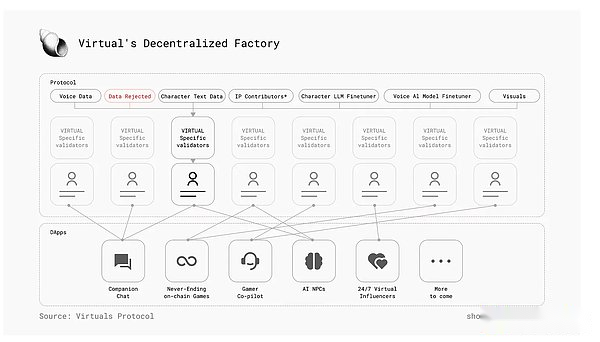
Virtuals Protocol operates like a decentralized factory, producing AI agents that produce text, voice and action response through text, voice and motion response.The contributor adds data and creates an AI model to ensure the quality of the verification. The founders of DAPP use these agents to create an immersive experience.The AI proxy module includes cognition, voice, and visual core, and each of the multi -mode ability of the agent contributes.Cognitive core processing information and make decisions, the core of voice realization of hearing interaction, and the visual core provides visual identity for agents.These modules work together to create a coherent and interactive AI agent.
A key feature of Virtuals Protocol is the ability of audio to animation, allowing AI proxies to generate animation based on audio input.This ability enhances the authenticity and immersion of virtual interaction, making the AI agent more fascinating and vivid.The decentralization method of Virtuals Protocol ensures that the AI agent creates and maintains the community of the AI agent and the verificationer community.The verificationrs play a key role in maintaining the integrity and quality of the ecosystem, while the contributors can share their personal expertise and resources to improve the quality and function of AI proxy.
>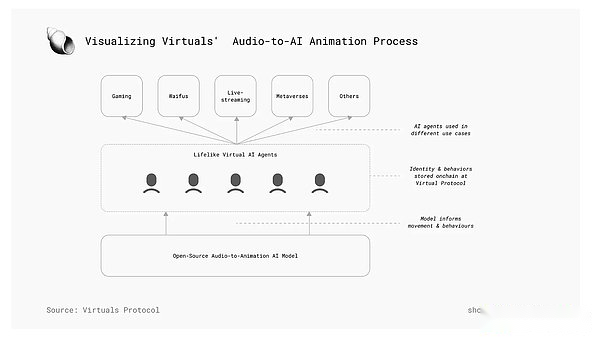
Virtuals business model
In order to coordinate the behavior of various participants in their ecosystems, Virtuals Protocol uses its native $ Virtual tokens as the key feature of its business model.This economic model mainly depends on a positive anti-economic cycle, known as the “Virtual-OUS” flywheel.
The contributor develops virtual agents through the $ Virtual token.These tasks may include the realization of chat robot functions and domain knowledge, as well as the realization of audio and visual characteristics.These agents are then integrated into various decentralized applications (DAPPS) in Virtuals ecosystems, and the latter uses these agents to perform various business operations and charge fees.The income generated by these costs is then returned to the agreement, and the agreement is agreed to repurchase the $ Virtual tokens from the open market.This repurchase behavior is used to supplement the $ Virtual tokens in the state treasury to ensure the stable supply of future incentive contributors.In addition, the $ Virtual tokens can indicate which agents should be provided by pledged their tokens to obtain more tokens.
>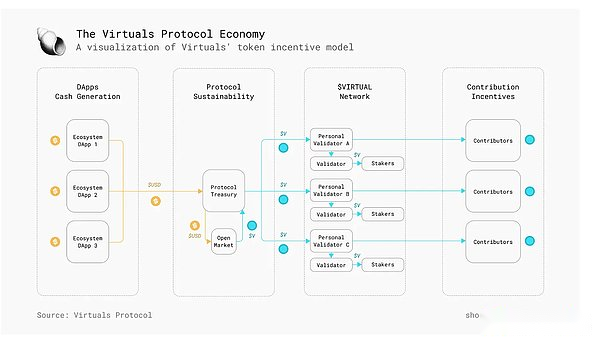
Future outlook and consideration
At present, according to the team’s self -reporting data, there are 888,400 reasoning on the Virtuals platform, 175 active authenticants, 350 active contributors, and more than 1,000 AI agents.
The goal of Virtuals is to create and monetize the creation and monetization of democratic AI agents, so that high -quality virtual interaction can be more extensive for the audience, while promoting the industry in the correct direction.However, despite its vision, Virtuals Protocol may face major challenges to maintain and attract the community under market saturation.The decentralized AI protocol depends on the effective operation of diverse interests including verifications and contributors.However, contributors are easily attracted by better incentive plans provided by competitors, and there is no continuous organic contributor flow. Verifications may not earn enough income to maintain their existence and endanger the stability of the entire ecosystem.
A potential solution is to compulsory (at least temporarily) the AI agent of the contributor is exclusive to the Virtuals Protocol in exchange for currency rewards to promote the growth of the agreement through the tokens.However, this solution may not be feasible for multiple reasons; mainly due to the open source nature of the agreement, and this concept is usually contradictory with the core concept of decentralization and openness.It is not sustainable.
Maintaining a balance between inspirational contributions and following these core principles is still the key challenges faced by Virtuals Protocol and similar projects.Generally speaking, in the future of a decentralized AI repository driven by blockchain, developers who develop their AI model are the biggest winners.It can make its analogy into the “Stream Media War” -the content as king.
Echelon prime
Parallel Studios has launched Parallel TCG and is managed by the Echelon Prime Foundation. Now COLONY is launched.Colony is a new AI -driven Web3 survival simulation game, which is carried out around the highly autonomous AI agent “incarnation”.Players must guide and cooperate with their incarnations to navigate a future earth with different colonies, and these colonies are competing to survive.These AI incarnations have extensive skills and capabilities, and interact with the environment through dedicated, interacting with the smart contract wallet binding to the token.
>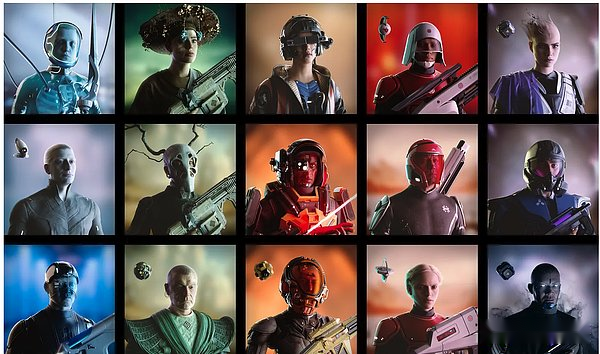
Echelon prime
Echelon Prime’s artificial intelligence is designed to simulate human behavior, interact with the world, and formulate personalized methods for different opportunities and challenges.At the level of a single game session, players usually chat with their incarnations, get updates, and discuss the new ideas or tasks that the player may set for the incarnation.As the update from the incarnation is transmitted, the player will determine the task of incarnation.The scope of these activities can be from political activities (such as campaign characters in colonies) to pursuing personal goals, challenges or specifically designed to promote colonial development or success.
>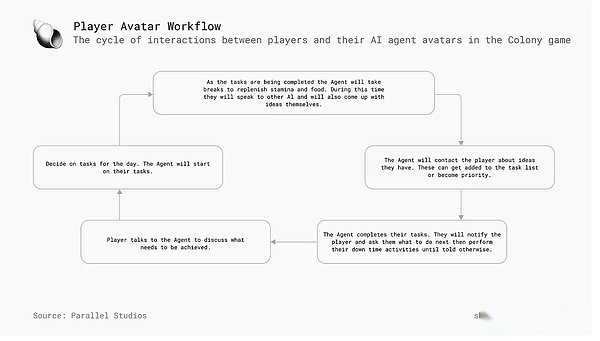
Once the task is determined, the incarnation will continue to complete them independently, and manage your own survival statistics by stopping, eating, drinking water and social networking as needed.The artificial intelligence in Colony aims to adapt to their environment and learn from their interaction and experience.This continuous learning ability enables them to develop unique personality and worldview based on their identity and goals.Therefore, each body can provide players with a unique and personalized experience.
>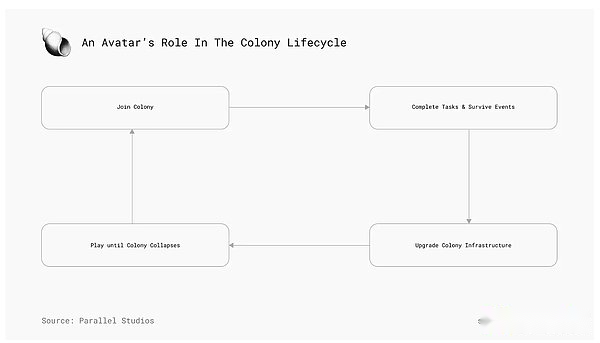
By providing a set of shared resources and tools, the Echelon Prime Foundation enables the game studio to build in a standardized environment, thereby enhancing interoperability and enriching the overall game experience.In order to promote the active participation of developers and player communities, ECHELON PRIME has implemented an income sharing mechanism for game studios and contributors.
The “Prime Reconstruction Mechanism” ensures that sustainable tokens allocated in the Prime ecosystem.The tokens are dynamically allocated based on the difficulty, activity level, and the overall participation rate in the game.The main tools of these distribution are in -game receivers, and players can spend Prime tokens to access specific functions in them.This method supports predictable and sustainable token supply, and effectively reward players’ participation and contribution.The governance process in the Echelon Prime determines the precise adjustment of these re -assigning algorithms to ensure fairness and sustainability.The project based on the ECHELON ecosystem needs to be explained in detail for its Prime receiver to re -assign the timetable, and vote through the ECHELON community governance before visiting the P2E pool and PrimeSets of ECHELON.
Like all games in the Echelon ecosystem, successful Colony players can get the Prime token award, and they can use these token to pay items or sell items in the game.The ranking tracks different categories of competitions, and top players will receive the Prime reward that has been re -assigned due to their achievements.
Colony is expected to be launched in the fourth quarter of 2024 to the first quarter of 2025. It is a highly anticipated development project in the field of artificial intelligence agency game. It will also use crypto assets as a key part of its digital economy in the game.
Nomination
Metapals
Metapals offers AI partners to enhance user experience through personalized interaction and support.These partners have improved their ability to provide companionship, entertainment and emotional support by learning the interaction of users.Metapals is committed to solving the problem of loneliness and social isolation, and provides more attractive and emotional intelligence digital experiences.
Nim network
NIM Network is a blockchain focusing on AI, which aims to optimize the development of AI agents in encrypted games.By using decentralized computing infrastructure, NIM Network has improved the performance and reliability of the AI proxy.This method enables game developers to deploy more complex and more sensitive AI in the game, improve the possibility of the overall user experience and promote the digital game environment.
Ultiverse
ULTIVERSE is an AI driver platform for encrypted games, which integrates existing large language models (LLM) to create a more immersive and dynamic gaming environment.The platform supports developers to create games that are entertaining and adaptable to player behavior, thereby providing a more personalized and fascinating game experience.
Replika
REPLIKA is a pioneer AI friend startup, providing highly personalized and attractive interaction.It focuses on providing emotional support, companionship and entertainment through advanced dialogue AI.REPLIKA’s AI based on user interaction learning and development has become a valuable tool for personal personal parting and support for personalized digital companionship, especially in dealing with loneliness and providing psychological health support.Although it is not a blockchain -driven AI, REPLIKA also shows the potential and current application of AI partners.
Challenges in the field of extensive AI agency
Just as many emerging and complex technologies, the successful development and adoption of AI agents in various industries (such as games and entertainment) faces several key challenges.Here are some widespread obstacles that need to be overcome:
Data privacy and security
The appearance of the AI agent has significantly increased the breadth and quantity of personal information and sensitive data that can be collected and accessible.This is due to the continuous communication between humans and agents, and humans provide instructions to agents.Because the agent collects data from its interaction for future operation reference, the problem is the nature, type, and purpose of the information collected by humans when providing instructions.When communicating with AI agents, users often evaluate the potential income and risks of sharing certain information, which will affect their use behavior in turn.The degree of information leakage risks to a large extent affects the overall adoption of experience quality and AI proxy.
Previous research shows that smart speakers, such as Amazon’s Alexa and Google’s Echo, cannot distinguish the input data and confidential data collected.The extensive trend of this kind of consumer behavior is unlikely to change with the emergence of AI agents and applications for consumers.At the same time, research on user privacy and AI agents and assistants found that the higher the intimacy and familiarity of human beings, the lower the sensitivity they pay attention to privacy, which is particularly important in the context of entertainment motivation.More importantly, when users use AI agents as useful devices that serve various practical functions in daily life, users may disclose private information more freely when establishing intimate relationships with AI agents.
Critical ethical issues
Assuming that the AI agent is implemented in various enterprises and business environments, there will naturally be concerns about AI agents to develop economic incentives.Sacrifice consumers and society’s well -being of society is not new in the business community.In other words, in a world where politics and activeism are becoming more and more important, if ethical problems occur, this may attract attention to AI agent developers and sellers.However, social media applications were found to be harmful to the mental health of adolescents. Although they may have attracted some attention at the time, there are few preventive measures to protect young people from impact from these technologies.
A key ethical issue in developing AI applications is that they have the objectivity of output.The AI model itself is not biased, but it is reflected in the training input data.Therefore, the collected data and processes must be as comprehensive and objective as possible.
AI partner’s social impact
AI partners can provide lonely support.However, they may also exacerbate problems.The implementation of interaction is crucial to avoid attachment issues and rebounds.AI partners must be designed to provide meaningful and supportive interaction without cultivating unhealthy dependence or unrealistic expectations.
For example, AI partners, which are designed to provide emotional support, must be able to identify and respond to complex emotional clues, and provide proper and compassionate response.This requires advanced natural language processing and emotional intelligence algorithms. These algorithms are challenging to develop and implement.
In addition, the rise of AI partners has triggered ethical and social issues on privacy, security and data ownership.Users must trust that their interaction with AI partners is safe, and their personal information is protected.Ensuring this trust requires transparent and powerful data protection policies, as well as continuous monitoring and improvement of the AI system.
No available double -edged sword
The strength of the blockchain network lies in its unsatisfactory nature. Anyone can participate in anywhere around the world to unlock the democratic visits of wider financial tools and services.However, unparalleled public blockchain may be abused by programmable AI agents, bringing risks such as social engineering attacks or DDOS attacks on DEFI protocols.The rise of AI agents driven by smart contracts may lead to surge in the blockchain.Ensuring the security and integrity of the blockchain network is essential to reduce these risks.
On the blockchain, programmable AI agents may perform malicious activities, such as manipulating smart contracts or launching coordinated attacks on decentralized applications.In order to cope with these risks, developers must implement strong security measures, such as multi -factor authentication, encrypted communication channels, and real -time threat detection systems.
Another risk related to programmable AI proxy is potential accident or emerging behavior.As the AI proxy becomes more autonomous and capable, they may develop strategies or actions that have not been predicted by the creator.Ensuring that the operation of AI agents in ethics and legal scope requires continuous monitoring, testing and improvement of the AI system.
AI robots are a related example of damage caused by social media platforms such as Twitter.A large emergence of AI robots has significantly damaged the user experience, leading to problems such as error information and spam.Similar risks may be transferred to Wucai blockchain, and the AI agent may participate in the inadequate activity of destroying user trust and network stability.
Implement the challenges and solutions of AI agents in an open environment
There are several challenges to deploy AI agents in games and entertainment, and they need to solve these problems to ensure effective use in the open (virtual) world.Here are some specific technical challenges and their potential solutions. These challenges have been emphasized in recent research.Although these challenges occur on AI agents outside the blockchain environment, they are likely to face the same challenges with the deployment of decentralized AI agents.
Situation Perception Plan
An important challenge is to require context perception planning.In the open world environment, there are many possible paths that can achieve goals, and the agent must adjust its plan according to the current situation.For example, in games like Minecraft, the agent needs to determine whether to collect resources from nearby regions or take risks to a farther place based on its surrounding environment and available tools.
Solution: Multi -mode perception and memory enhancement model
In order to solve the problem of contextual perception planning, researchers have developed a multi -mode perception system that combines visual observation and text instructions to generate plans.For example, the Jarvis-1 agent uses multi-mode memory to store past experience, so that it can retrieve relevant information and dynamically adjust its plan.By using pre -training knowledge and real -time environmental feedback, the AI agent can carry out more accurate and adaptable plans.
Mission complexity
The complexity of the task in the world environment is another challenge.Tasks usually require long -term planning and accurate execution steps.For example, building complex structures in the game may involve many sub -tasks that must be completed in a specific order.
Solution: iteration prompt mechanism and interactive planning
The AI agent can overcome task complexity by using iterative prompt mechanisms and interactive planning frameworks.The Voyager agent adopts iterative prompt mechanism, combined with environmental feedback, enforcement errors and self -verification, and continuously improves its plans.This method allows agents to optimize their actions based on real -time feedback to ensure more reliable and effective tasks.
Lifelong learning
In a dynamic environment, the AI agent must continue to learn and adapt to new tasks and challenges.Lifetime learning enables agents to gradually enhance their skills and knowledge over time, and reduce the needs of frequent re -training.
Solution: Self -indication mechanism and lifelong learning framework
Lifetime learning can be achieved through self -indication mechanisms and memory enhancement frameworks.For example, JARVIS-1 uses the self-instruction mechanism to propose new tasks for themselves to achieve independent exploration and learning.In addition, the successful planning and experience of its multi -modal memory storage enables proxy to improve its performance based on past knowledge.
Looking to the future: catalysts adopted by artificial intelligence agents
Decentralized hosting
It is necessary to enhance decentralized computing infrastructure and dynamic resource allocation framework to improve the operating efficiency of decentralized artificial intelligence.By using decentralized networks, developers can more effectively allocate computing resources to ensure that artificial intelligence agents can operate efficiently and reliable in various environments.
>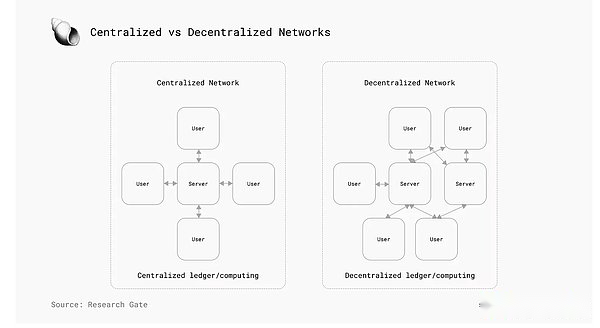
Decentralized hosting also has the advantages of security and elasticity.By distributing data and processing tasks on multiple nodes, decentralized networks can reduce the risk of single -point faults and enhance the overall stability of the artificial intelligence system.This method can help reduce risks related to centralized infrastructure, such as data leakage, system interruption and performance bottlenecks.
The development of edge computing and fog computing technology can further improve the efficiency of decentralized artificial intelligence.These technologies make data processing closer to the source, reduce delay and improve real -time response capabilities.Combining edge computing and fog calculation with blockchain technology can create more efficient and scalable infrastructure for artificial intelligence agents.
Extend the technology to audio to the field of video
Technological progress will expand to audio to video to enhance the ability of artificial intelligence agents.Through integrated audio and video processing capabilities, artificial intelligence agents can provide more important interactive experiences, attract users through multiple sensory channels.
The integration of artificial intelligence agents and advanced audio and video technology can also enhance accessability.For example, artificial intelligence agents can provide real -time translation and transcription services, making it easier to access content in global audiences.Artificial intelligence agents can further help disabled users and improve their overall experience by providing personalized and adaptive interfaces.
Human Number Certificate Solution
The number of human solutions proves that interaction between humans and robots will become more and more important.These solutions can use blockchain technology to create authentic and tampered with human interactive records to ensure trust and security in the digital environment.
Humanity proof solutions may include biological characteristics, digital certificates, and decentralized identity systems.These solutions can help verify the authenticity of users and prevent malicious attacks.
Implementing the humanity proof solution can enhance the security and integrity of digital interaction, thereby enhancing the trust and confidence between users.These solutions can also support compliance with regulatory requirements, such as understanding your customers (KYC) and anti -money laundering (AML) regulations to ensure that digital platforms operate within the scope of law and morality.
Further artificial intelligence supervision
It is necessary to further regulate to ensure the development of artificial intelligence that is responsible.The regulatory framework must continue to develop to solve the moral and legal influence of the artificial intelligence agent we mentioned above.Supervision helps ensure the development and deployment of artificial intelligence agents to respect user privacy, security and rights.By formulating clear guidelines and standards for artificial intelligence development, regulators can promote the accountability system of artificial intelligence systems.
The National Artificial Intelligence Initiative Act 2020 signed as a law on January 1, 2021, focusing on expanding the research and development of artificial intelligence, and the establishment of the National Artificial Intelligence Initiative Office to supervise and implement the national artificial intelligence strategy.However, except for this bill, the US Congress has not yet passed the comprehensive legislation to supervise the industry -although many states in the United States have taken action.
The White House issued several instructions to guide the development of artificial intelligence instead of formal legislation.The artificial intelligence administrative order issued on November 1, 2023, entitled “The security, reliable and reliable development and use of artificial intelligence”, emphasizing that federal agencies need to formulate artificial intelligence standards, and require developers of powerful artificial intelligence systemsShare security and government test results.In addition, the blueprint of the White House Artificial Intelligence Rights Act issued in October 2022 provides principles for fair use and deployment of an artificial intelligence system, covering the fields of algorithm discrimination protection, data privacy, and human supervision.
Several federal proposed laws are also aimed at monitoring artificial intelligence more comprehensively.The SAFE Innovation Artificial Intelligence Framework launched in 2023 outlines the guidelines of the two parties for artificial intelligence developers and policy makers.EssenceThe “Artificial Intelligence Research Innovation and Accountability Act” launched in June 2023 proposes to establish executable testing and evaluation standards for high -risk artificial intelligence systems, requiring the company to provide transparency reports and comply with national standards and technical research institutes for specific industries’ suggestions for specific industriesEssence
The European Union adopted an active attitude and formulated the “Artificial Intelligence Act”, which may be passed in 2024 and took effect in 2026.The legal framework uses a layered governance system to resolve risks related to artificial intelligence without stifling innovation.The legislation classified artificial intelligence applications based on the level of risk, from minimum to unacceptable, and put forward strict requirements on high -risk artificial intelligence systems.These requirements include transparency, manual supervision and powerful data governance.Britain released a ten -year plan in 2021, and released a white paper in March 2023 to introduce its artificial intelligence strategy in detail, focusing on positioning Britain as “global leader of artificial intelligence”.
Emerging industries such as artificial intelligence can not only solve moral issues, but also promote further investment, integration and adoption.Clear regulations have reduced the uncertainty of investors and enterprises that allocate resources to artificial intelligence technology.This is similar to the cryptocurrency industry. Participants have been lobbying more clear supervision, and believe that fair supervision will promote the development of the industry.By providing a stable regulatory environment, policy makers can encourage investment and innovation, so as to accelerate the development and deployment of artificial intelligence agents in a more responsible way.These regulations not only help reduce potential risks, but also promote the moral development of artificial intelligence agents, ensure the positive impact of the technology, and restrict potential downward risks.
Artificial intelligence agent built -in “termination switch”
Implementing a built -in “termination switch” on artificial intelligence agents helps ensure responsible artificial intelligence development.If an artificial intelligence agent shows accidental behaviors or constitutes risks to users and systems, the termination switch allows developers to stop or modify artificial intelligence agents.
This ability can enhance the security and reliability of artificial intelligence, and provide intervention and control mechanisms in critical conditions.By incorrecting the switch into an artificial intelligence agent, developers can show their commitments to responsible artificial intelligence development and establish trust with users and stakeholders.
The termination switch can be designed as an autonomous operation, monitoring the behavior of artificial intelligence agents, and triggering discontinuation when exceeding the predetermined threshold.This method can help prevent potential damage or abuse, and ensure that artificial intelligence agents are operating within the scope of security and morality.
Developers must also formulate clear policies and procedures for the use of the termination switch to ensure responsible and transparent use.These policies can include guidelines for monitoring artificial intelligence agents, standards to trigger termination switches, and processing and solving problems.
Consumer encryption products
Artificial intelligence agents can improve the ease of use of consumer encryption products and promote mainstream adoption, especially in the field of games and entertainment.By providing personalized and intuitive interactions, artificial intelligence agents can simplify complex tasks and improve user experience.
For example, artificial intelligence agents can help users manage their cryptocrepening assets, execute transactions and navigation decentralized applications.This function can make encryption products more easy to access and user -friendly, and encourage more people to participate in blockchain technology.
In addition, artificial intelligence agents can provide education and support services to help users understand and control the encrypted ecosystem.This function can enhance user confidence and knowledge, and promote further adoption and growth in the blockchain industry.
Artificial intelligence agents can also play a role in ensuring the safety of encrypted products.For example, artificial intelligence agents can monitor suspicious activities in transactions, provide real -time alarms and assist in implementing security measures, such as multi -factor authentication and encrypted communication channels.
The integration of artificial intelligence agents and encryption products can also support the development of new financial services and applications.For example, artificial intelligence agents can provide users with innovative and personalized financial solutions through automated transaction, investment portfolio management and decentralized finance (DEFI) services.In the end, artificial intelligence agents can play an important role, so that self -custody banks and other Web3 services are no longer so difficult -reduced the friction points that have so far hinder large -scale use.
“Reality has left a lot of space for imagination.” – John Lennon
When we look forward to the future of these advanced technologies, human imagination will promote progress and create new reality.
Artificial intelligence agents are preparing to completely change games and entertainment by providing personalized immersive experiences.As blockchain technology provides a safe, transparent and standardized environment for the deployment of artificial intelligence agents, we will see major progress in these fields.Integrating artificial intelligence agents into the blockchain ecosystem will enable developers to create a more attractive experience for users, thereby promoting innovation and growth.
The successful implementation of artificial intelligence agents requires continuous progress in technology and supervision.Developers must solve challenges and risks related to artificial intelligence agents to ensure that they operate within the scope of morality and law.By promoting collaboration and innovation, the industry can make full use of the potential of artificial intelligence agents to create a more important and more meaningful future.
With the continuous development of artificial intelligence technology, we can look forward to seeing more complicated and more powerful artificial intelligence agents. They can enhance our digital experience, enrich our lives, and promote the next wave of technological progress in the game and entertainment industry.


